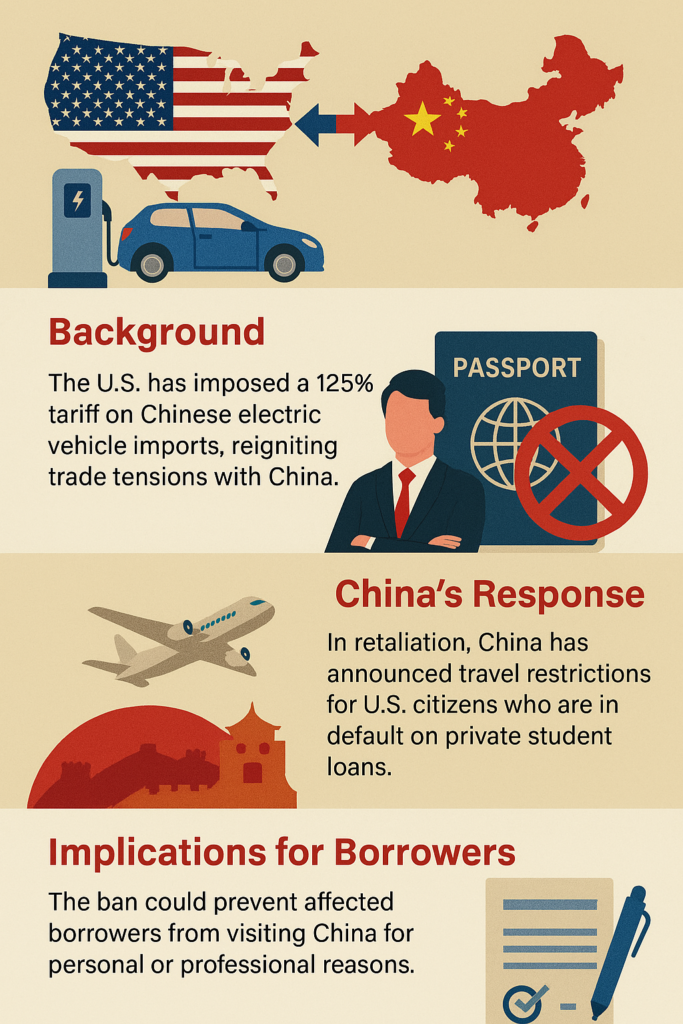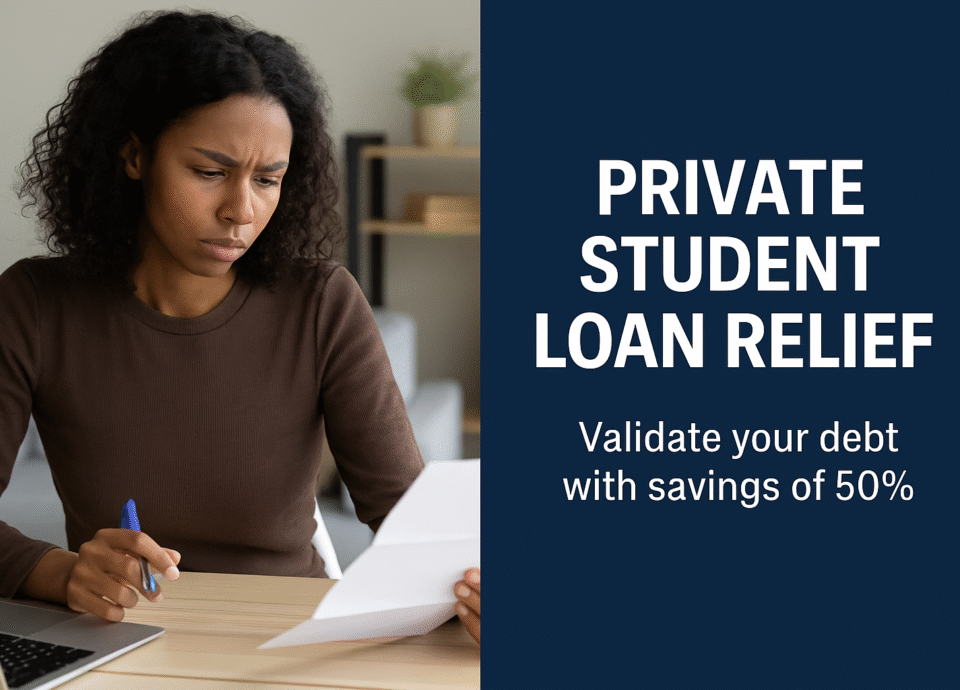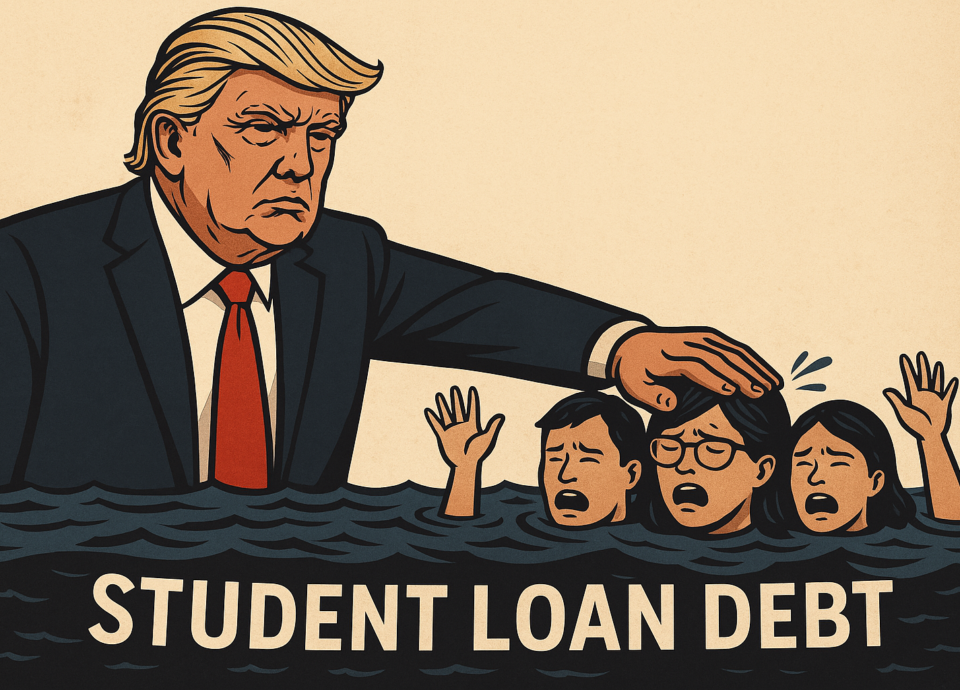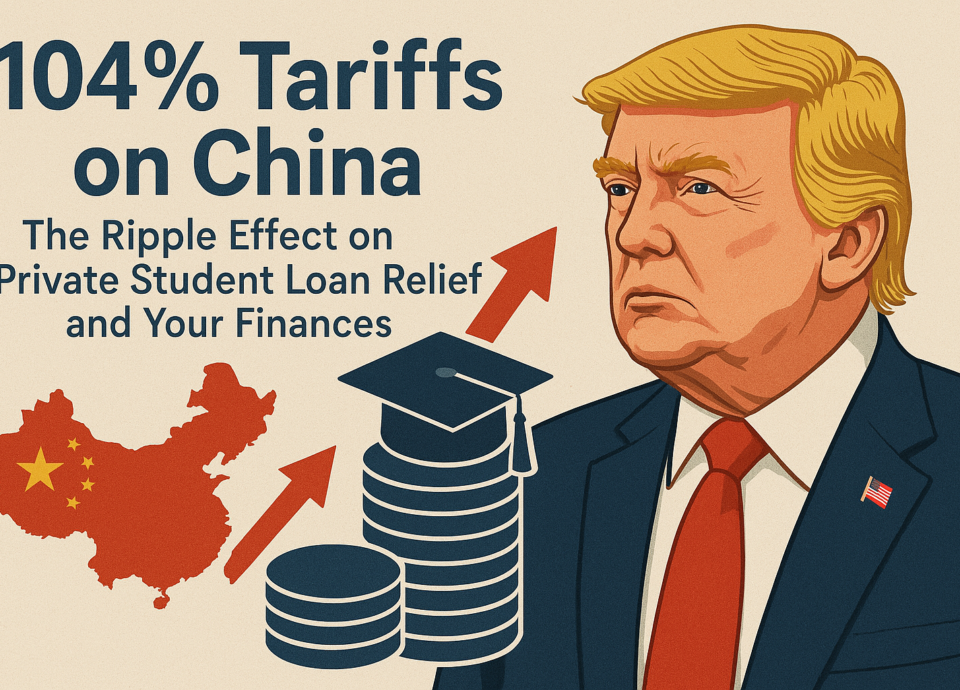Introduction: Tariffs, Trade Wars, and Student Debt
In an unprecedented escalation of the U.S.-China trade war, the United States recently imposed a 125% tariff on imports from China – a massive levy aimed at pressuring Beijing. In response, China has retaliated in kind, raising tariffs on all U.S. goods to 125% as well. These tit-for-tat measures signal more than just geopolitical posturing; they carry real consequences for everyday Americans. One surprising area of impact is private student loan relief. While global trade disputes might seem far removed from your student loan payments, they can indirectly squeeze borrowers by raising living costs, pushing up interest rates, and shaking economic stability. This article explores how the new tariffs and China’s reported retaliatory tactics could affect Americans with private student loan debt – and why seeking private student loan relief is more important than ever.
Americans today are already struggling with enormous student debt burdens. As of late 2023, U.S. borrowers owed over $1.7 trillion in student loans (federal and private combined). Private student loans make up a significant share of that total, and unlike federal loans, they often lack flexible repayment options or forgiveness opportunities. Now, with a volatile trade war brewing, borrowers may face even tougher financial headwinds. Before diving into solutions like private student loan relief, let’s break down what’s happening on the international stage and why it matters for your wallet.
Trade War Escalation: 125% Tariffs and China’s Retaliation
After months of rising tensions, the U.S. government dramatically upped the ante by slapping a 125% tariff on Chinese imports – essentially more than doubling the cost of those goods. This country-specific tariff hike was part of a broader policy to pressure trade partners, with China singled out for the steepest rate Beijing quickly answered with retaliatory tariffs, boosting its own levies on all U.S. exports from 84% to 125% effective immediately. Such extreme tariffs are nearly unheard of in modern trade, and they mark a severe escalation of the trade war.
A bustling container port where international trade flows. Trade disputes and high tariffs between superpowers can send shockwaves through the global economy, ultimately affecting everyday consumers and borrowers.
This tariff battle isn’t just an abstract policy fight – it has tangible effects. Tariffs of this magnitude raise prices for imported goods, and those costs often get passed to American consumers at the store. In fact, critics have slammed these tariffs as effectively a “permanent tax on the American consumer”. Beyond higher prices, China’s retaliation may go further. Beijing has a range of countermeasures, reportedly including moves to “fight till the end” – from restricting exports of critical materials to leveraging financial weapons. For example, China holds a large amount of U.S. Treasury debt. A mass sell-off of those Treasuries could “cause yields to spike, sharply increasing borrowing costs” across the economy. In plain English, that means interest rates on things like mortgages, business loans, and yes, private student loans could climb.

There are even reports and speculation that Chinese officials are eyeing America’s household debt vulnerabilities as a pressure point – which would directly concern those with heavy private student loan debt. Whether or not China explicitly targets this group, the ripple effects of the trade war certainly do. As we’ll see next, the fallout from these international tensions stands to hit borrowers in several ways.
Impact on Borrowers: Why Trade Tensions Hurt Private Student Loan Borrowers
When global economic giants clash, ordinary people can feel the pain. Private student loan borrowers – many already juggling high-interest debt – may be especially vulnerable to the side effects of a trade war. Here are a few key impacts:
Rising Interest Rates: Trade war uncertainty and aggressive retaliatory measures can spook financial markets. If China dumps U.S. bonds, it would drive down bond prices and push interest yields up, translating to higher rates on new loans. Many private student loans carry variable interest rates tied to benchmarks like LIBOR or the prime rate. As those rates rise, borrowers could see their monthly payments increase unexpectedly. Even fixed-rate private loans might become costlier to refinance as overall lending rates climb. In short, a prolonged tariff battle puts upward pressure on the cost of borrowing money in the U.S.
Higher Consumer Prices (Inflation): Tariffs make imported goods more expensive. From groceries to gadgets, American consumers will pay more due to the 125% import taxes – an effect akin to a tax on everyday life. When you’re already struggling to pay off private student loans, higher prices for essentials tighten your budget further. Money that could have gone toward extra loan payments might instead be spent on gas, food, or other inflated expenses. This inflation erosion means less disposable income to allocate toward debt relief or payoff. Borrowers living paycheck-to-paycheck will feel this acutely.
Economic Slowdown and Job Security: Major trade disruptions are rattling investors and economists. Stock markets have plunged amid these tariff announcements, and there are growing fears of a global recession. If the economy slows or enters a recession, unemployment could rise. Borrowers – including recent graduates and even seasoned professionals – might face layoffs or reduced income. For someone with large private student loan bills, a job loss can be devastating since private loans offer few safety nets (like unemployment deferments) compared to federal loans. Even short of a recession, the uncertainty may cause companies to freeze hiring or raises. Stagnant or lower income, combined with potentially higher interest costs, is a worst-case scenario for indebted Americans.
In sum, the trade war’s trickle-down effect can squeeze private loan borrowers from both sides: higher expenses and higher borrowing costs paired with a risk of lower income. It’s a perfect storm that makes the case for seeking relief stronger than ever.
Understanding Private Student Loan Relief
Private student loan relief refers to strategies that help borrowers manage, reduce, or eliminate their private education debt. This is crucial because private student loans are fundamentally different from federal student loans in terms of borrower protections. Unlike federal loans (which have options like income-driven repayment, deferral, and potential forgiveness), private student loans offer far fewer safeguards for borrowers. There are no government programs to forgive private loans en masse, and hardship options are limited. If you’re struggling with a private loan, you often must rely on the lender’s mercy or pursue relief through negotiation or legal avenues.
Key approaches to private loan relief include refinancing, negotiating settlements, and debt validation. Refinancing with a private lender could secure a lower interest rate or longer term to reduce payments – but in a rising rate environment fueled by trade tensions, refinancing may not yield favorable rates. Negotiating a settlement involves convincing the lender or collection agency to accept less than the full amount owed (often in lump sum) to consider the debt paid. This can sometimes significantly cut what you have to repay, though it may require cash on hand or occur after a loan defaults.
Debt validation, however, is a more specialized relief tactic frequently employed by experts like Private Student Relief. In a debt validation process, the borrower (or their advocate) challenges the legitimacy of the debt and demands the lender or collector prove that the debt is valid and that they have the legal right to collect it. It’s not uncommon for loans – especially if they’ve been sold to collection agencies – to lack proper documentation. If a lender cannot produce the required paperwork (e.g. the original promissory note, chain of title, account statements), they may have to dismiss or discharge the debt. This can result in the borrower no longer being obligated to pay it. For someone with a large private loan, successful debt validation is a form of complete relief.
It’s important to note that while these relief methods exist, navigating them can be complex. Private Student Relief – a company with over 9 years of experience in private student loan relief services – has been a lifeline for many borrowers facing these challenges. In the next section, we’ll highlight how professionals can help you tackle private student debt, especially in turbulent economic times. (For context, even high-debt professionals benefit from relief strategies; for example, there are programs focused on private student loan relief for physicians and other graduate-degree holders who often carry six-figure loan balances. The principles of relief remain the same across the board.)
Professional Debt Relief Services – The Private Student Relief Advantage
When it comes to dealing with private student loans, expert help matters. This is where Private Student Relief stands out. With over 9 years of experience in debt validation and private student loan relief, their team has developed proven strategies to assist borrowers in regaining control of their finances. Unlike general debt settlement companies, Private Student Relief focuses exclusively on private student loan debt, which means they understand the unique legal and financial landscape of these loans.
What services do they offer? Private Student Relief professionals will typically start by analyzing your loan details and financial situation. One of their core offerings is the aforementioned debt validation service – essentially auditing your private loan to identify any discrepancies or lapses in documentation that could invalidate the debt. Over nearly a decade, they have honed this process, often finding that lenders cannot fully validate certain old or transferred private loans. In such cases, they can negotiate for the debt to be canceled or significantly reduced. This is a highly specialized form of private student loan relief that few borrowers can achieve on their own.
Additionally, Private Student Relief can negotiate with lenders on your behalf. If validation doesn’t void the loan, their experts might secure a modified repayment plan or a settlement that saves you money. They also educate borrowers on their rights (for instance, what collectors can or cannot do) and ensure you’re not falling victim to unlawful collection practices. With the economy in flux due to international trade issues, having a seasoned advocate by your side provides peace of mind.
Perhaps most importantly, Private Student Relief provides personalized guidance. No two debt situations are exactly alike. By consulting with their team, you get a tailored relief roadmap – whether it’s disputing the debt, consolidating it, or attacking it with a settlement strategy. Their track record over 9+ years is a testament to the success of their methods in achieving private student loan relief for countless clients.
Strong Call to Action: Don’t wait for things to get worse. Now is the time to explore your relief options. Contact Private Student Relief today for a free consultation and take the first step toward freeing yourself from the burden of private student debt. With experts in your corner, you can navigate this challenge confidently, even as the economic winds shift.
Frequently Asked Questions (FAQs) about Private Student Loan Relief and Trade Tensions
What is private student loan relief?
Answer: Private student loan relief refers to any program or strategy that helps you reduce or manage the debt from private student loans. This can include refinancing to a lower rate, negotiating reduced payoff amounts, or using legal tactics to challenge the debt’s validity. Unlike federal student loan relief (which might involve government programs or forgiveness), private loan relief usually requires working with your lender or a specialized debt relief company. The goal is to ease the repayment burden – whether by lowering monthly payments, cutting the total balance, or even getting the debt dismissed in some cases.
Could the US-China trade war really affect my private student loans?
Answer: Indirectly, yes. The trade war – especially extreme measures like 125% tariffs – can influence the broader economy. If tariffs drive up inflation and interest rates, the interest on private student loans could rise for those with variable-rate loans. You might end up paying more in interest over time. Additionally, if the trade war slows the economy or triggers a recession, you could face job insecurity or stagnating income, making it harder to afford your loan payments. In essence, a tense trade environment can tighten your budget and increase borrowing costs, which hurts private loan borrowers. This is why it’s wise to seek private student loan relief strategies now, as a form of protection.
Do tariffs cause interest rates on private student loans to increase?
Answer: Tariffs themselves don’t directly change your loan’s interest rate, but their economic ripple effects can. When a trade war heats up, it can spook investors and lead to higher market interest rates. For example, if China retaliates by selling off U.S. Treasury bonds, it would “sharply increase borrowing costs” in the U.S.. Most private student loan lenders base their variable interest rates on benchmarks that follow the market (like the prime rate). So if those benchmarks rise due to trade-war-driven inflation or market volatility, your variable loan rate can go up, meaning you pay more interest. If you have a fixed-rate private loan, your current rate won’t change, but new loans or refinances would likely come at higher rates. Bottom line: prolonged trade tensions make all borrowing more expensive, including education debt.
What can I do if I’m struggling with private student loan payments due to economic changes?
Answer: If you’re finding it hard to keep up with private loan payments – whether due to higher living costs, loss of income, or rising interest – don’t ignore the problem. Start by contacting your lender to see if any hardship options are available (some private lenders offer temporary forbearance or modified plans, though they are not required to). Next, consider consulting a debt relief specialist. Companies like Private Student Relief can evaluate if you’re a candidate for debt validation or settlement, potentially reducing what you owe. It’s also wise to budget tightly during uncertain times: cut unnecessary expenses and prioritize your loan payments to avoid default. If you have decent credit and stable income, you could explore refinancing to a fixed rate to protect against future rate hikes (just ensure the new rate truly saves money). Every borrower’s situation is different, but seeking professional advice early increases your chances of finding a workable solution.
How can Private Student Relief help with my private student loans?
Answer: Private Student Relief is a specialized service provider focused on helping borrowers find relief from private student debts. They can assist in several ways. First, they will review your loan details and see if there’s an opportunity for debt validation – where the lender must prove the debt is legitimate. If successful, this can lead to your debt being cancelled or significantly reduced. Even if validation isn’t an option, Private Student Relief can negotiate with your lender or collection agency on your behalf. Thanks to their 9+ years of experience in this field, they know the best strategies to potentially lower your interest rate, set up affordable payment plans, or even settle the debt for less than you owe. Essentially, they become your advocate, handling the tough conversations and legal intricacies for you. Borrowers who felt hopeless often find a path forward once these experts step in. By working with Private Student Relief, you’re tapping into seasoned knowledge of private loan contracts, consumer protection laws, and negotiation tactics – all geared toward one thing: achieving relief from your private student loan burden.
Is now a good time to seek private student loan relief?
Answer: Absolutely. In fact, there may be no better time than right now to explore your relief options. With the trade war introducing so much uncertainty into the economy, waiting could be risky. If you act now, you can get ahead of any worsening conditions. For instance, if interest rates are likely to rise, addressing your loans sooner (through refinancing or negotiation) could lock in savings before costs go up. Likewise, if you worry about your job or finances, pursuing relief or backup plans today will cushion you in case of future setbacks. Moreover, private student loan relief processes – like settlements or validations – can take time to complete. Starting the process now means you’re more likely to see results when you need them. The bottom line: given the unpredictable fallout of the U.S.-China tariff dispute, securing relief now is a smart, proactive step to protect your financial future.
Conclusion: Don’t Wait to Seek Relief
In conclusion, the escalating trade war and its economic aftershocks are a wake-up call for borrowers. While you can’t control international tariffs or China’s retaliations, you can take charge of your own student debt situation. If you have private student loans, it’s crucial to stay informed and proactive. The 125% tariffs and Chinese countermeasures underscore how quickly broader events can tighten our personal finances. Rather than hoping it all blows over, consider taking action to fortify yourself – whether that means refinancing while rates are still reasonable, or working with experts to reduce what you owe.
The importance of seeking private student loan relief now cannot be overstated. By addressing your debt head-on, you’ll be better prepared for whatever comes next. Relief might come in the form of a lower payment, a paused collection, or maybe the elimination of a chunk of your debt – each outcome brings you closer to financial stability. With the help of experienced professionals like Private Student Relief, you have a fighting chance to achieve freedom from private loan debt even in these uncertain times. Remember, every dollar of debt you shed and every point off your interest rate is more peace of mind for you. Given the volatile economic climate, today is the best time to explore your options, get relief, and secure your financial future. Take that step now, and you’ll thank yourself later.



